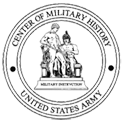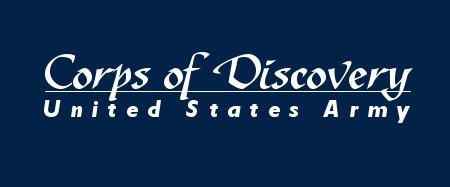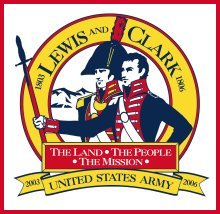The U.S. Army and the Lewis & Clark
Expedition
Part 2: President Jefferson's Vision
Thomas Jefferson, author of the Declaration of Independence and third
president of the United States, did much to help create the new nation.
Perhaps his greatest contribution was his vision. Even before he became
president, Jefferson dreamed of a republic that spread liberty and representative
government from the Atlantic Ocean to the Pacific Ocean. As one of the
leading scientific thinkers of his day, he was curious about the terrain,
plant and animal life, and Indian tribes of the vast, unknown lands
west of the Mississippi River. As a national leader, he was interested
in the possibilities of agriculture and trade in those regions and suspicious
of British, French, Spanish, and Russian designs on them.
On 18 January 1803, months before President Jefferson had acquired
the region from France through the famous Louisiana Purchase, he sent
a confidential letter to Congress, requesting money for an overland
expedition to the Pacific Ocean. Hoping to find the Northwest Passage,
Jefferson informed Congress that the explorers would establish friendly
relations with the Indians of the Missouri River Valley, help the American
fur trade expand into the area, and gather data on the region’s
geography, inhabitants, flora, and fauna.
 To
conduct the expedition, Jefferson turned to the U.S. Army. Only the
military possessed the organization and logistics, the toughness and
training, and the discipline and teamwork necessary to handle the combination
of rugged terrain, harsh climate, and potential hostility of the endeavor.
The Army also embodied the American government’s authority in a
way that civilians could not. Indeed, the Army provided Jefferson with
a readily available, nationwide organization that could support the
expedition — no small consideration in an era when few national
institutions existed. Although the expedition lay outside the Army’s
usual role of fighting wars, Jefferson firmly believed that in time
of peace the Army’s mission went beyond defense to include building
the nation. Finally, the man that Jefferson wanted to lead the expedition
was an Army officer: his personal secretary, Capt. Meriwether Lewis.
To
conduct the expedition, Jefferson turned to the U.S. Army. Only the
military possessed the organization and logistics, the toughness and
training, and the discipline and teamwork necessary to handle the combination
of rugged terrain, harsh climate, and potential hostility of the endeavor.
The Army also embodied the American government’s authority in a
way that civilians could not. Indeed, the Army provided Jefferson with
a readily available, nationwide organization that could support the
expedition — no small consideration in an era when few national
institutions existed. Although the expedition lay outside the Army’s
usual role of fighting wars, Jefferson firmly believed that in time
of peace the Army’s mission went beyond defense to include building
the nation. Finally, the man that Jefferson wanted to lead the expedition
was an Army officer: his personal secretary, Capt. Meriwether Lewis.
A friend and neighbor of Jefferson’s, the 28-year-old Lewis had
joined the Virginia militia to help quell the Whiskey Rebellion of 1794
and then had served for eight years as an infantry officer and paymaster
in the Regular Army. In Lewis, Jefferson believed he had an individual
who combined the necessary leadership ability and woodland skills with
the potential to be an observer of natural phenomena.





